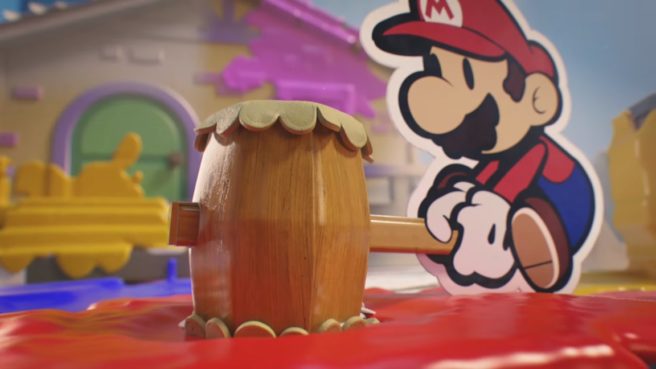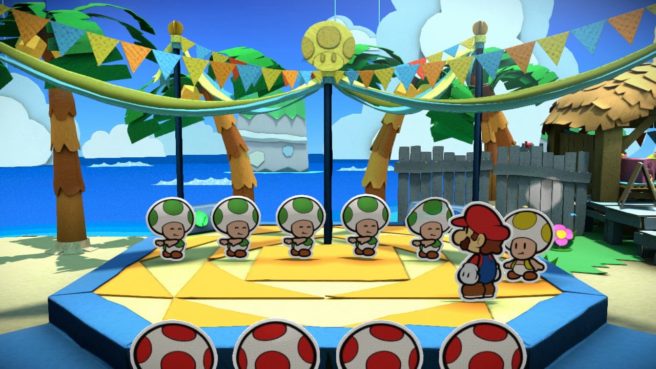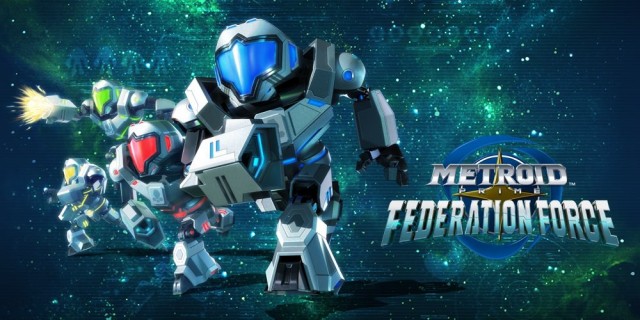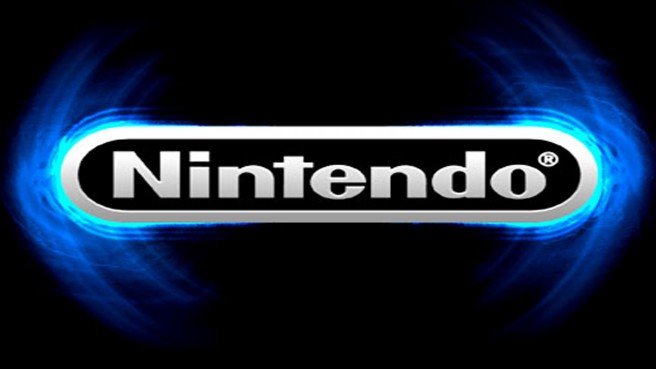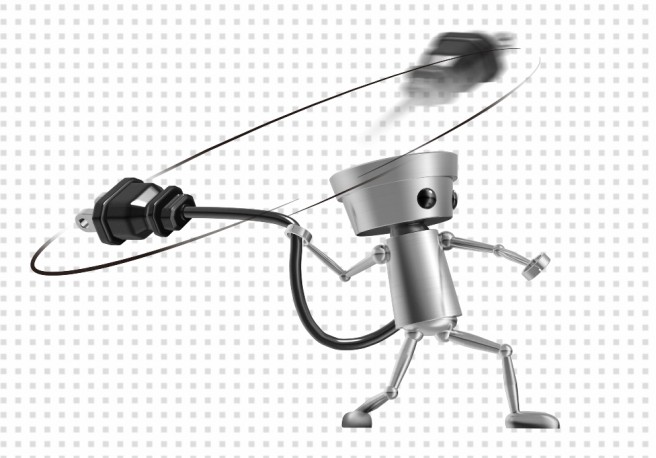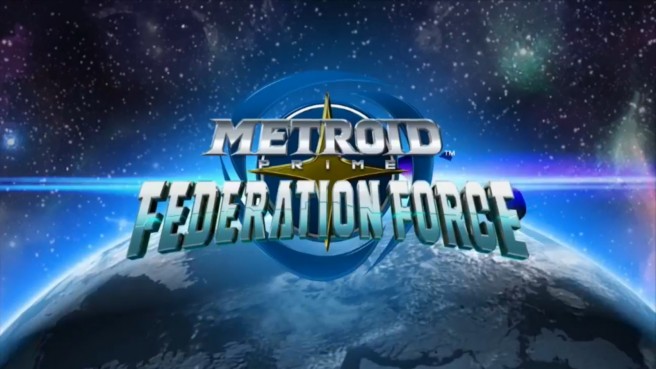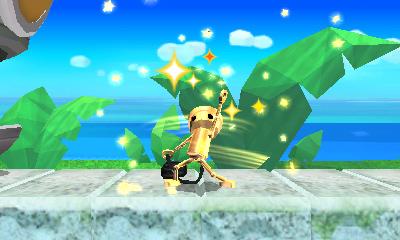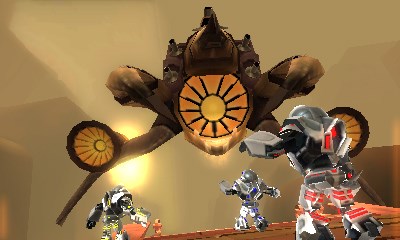Paper Mario: Color Splash dev on paint inspiration, approach to combat, says team put in its full effort
Posted on 9 years ago by Brian(@NE_Brian) in News, Wii U | 22 Comments
Game Informer has now published its full interview with Paper Mario: Color Splash producer Kensuke Tanabe. Tanabe was asked about a variety of topics, including the inspiration behind repainting the world, whether the team ever considered ditching combat entirely, and the team’s sense is for what fans of the Paper Mario series would like to see in the future.
Continue on below for a roundup of Tanabe’s notable responses. Read the full interview on Game Informer here.
Paper Mario: Color Splash producer on lack of returning NPCs, new game would feature “a different system”
Posted on 9 years ago by Brian(@NE_Brian) in General Nintendo, News, Wii U | 47 Comments
Paper Mario’s first two games featured many original characters and party members with original abilities. However, since then, the series has been moving away from that. It is especially evident in Color Splash, as many of the characters encountered are Toads.
Game Informer spoke with Kensuke Tanabe, the Wii U title’s producer, in this month’s issue. The magazine started out by asking why old NPCs from the early Paper Mario games haven’t returned. Tanabe replied with the following:
More: interview, Kensuke Tanabe, top
Nintendo explains why it settled on Metroid Prime: Federation Force’s art style
Posted on 9 years ago by Brian(@NE_Brian) in 3DS, News | 30 Comments
A few hours ago, Nintendo shared a new Metroid Prime: Federation Force video. It contained commentary from Kensuke Tanabe, the game’s producer.
Kotaku picked out one excerpt from the interview which is particularly interesting. At one point, Tanabe explained why Federation Force’s art style was chosen.
Tanabe spoke about how Next Level Games wanted “to make a multiplayer gameplay experience great on a handheld system” following Luigi’s Mansion: Dark Moon. Technical hurdles were in the way, however. Another issue was that players would be shooting objects that look tiny on a small handheld screen. That eventually led to the “more rounded art style for the characters”.
Here’s Tanabe’s full explanation:
Rumor: Kensuke Tanabe and Retro no longer on good terms, Sakamoto could be new NCL producer
Posted on 9 years ago by Brian(@NE_Brian) in General Nintendo, Rumors | 44 Comments
Nintendo’s Kensuke Tanabe has long been associated with Retro Studios. While working with the company, Tanabe acted as producer (or co-producer) on all of its games – the Metroid Prime and Donkey Kong Country titles. Now, however, the two sides “are allegedly no longer on good terms,” according to a report from Liam Robertson.
Here’s one excerpt from Robertson’s report:
“Last year, I was investigating Tanabe with regards to this. This involved speaking to a number of developers who had worked alongside him. The way in which they all described Tanabe’s directorial style was fascinating. Their words built up a portrait in my mind of a Gordon Ramsey esque figure who strived for perfection and berated anything short of it. It’s difficult for me to fully convey my impressions of him without explicitly detailing the anecdotes shared with me in confidence, which could compromise those involved; but I will try my best to elaborate.
More: Kensuke Tanabe, Retro Studios
Nintendo on how they make games, fun is the most important aspect, amiibo
Posted on 10 years ago by Brian(@NE_Brian) in General Nintendo, News | 33 Comments
Gamasutra has several quotes up from producer Risa Tabata and Kensuke Tanabe, who work with external teams at Nintendo. Tabata has been involved with games such as Metroid Prime while Tanabe has been with the company for nearly three decades.
While speaking with Tabata and Tanabe, Gamasutra asked about how Nintendo tends to make its games, working with external developers, and even amiibo. Continue on below for their thoughts.
More: interview, Kensuke Tanabe, Risa Tabata, top
Nintendo on the difficulty of finding mainstream success with Chibi-Robo, Zip Lash could be their last chance
Posted on 10 years ago by Brian(@NE_Brian) in 3DS, News | 34 Comments
Nintendo has tried a few different concepts with Chibi-Robo over the years. We know that it started out as an adventure game of sorts, but the series has since dabbled with photographs and now platforming. This is all intentional, as Nintendo seems to have struggled making the character a mainstream success.
Kensuke Tanabe, a producer from the company, recently spoke with The Verge about how it hasn’t been easy making Chibi-Robo resonate with all players. He also suggested that Zip Lash could be the last entry in the franchise if it doesn’t perform well.
“To be honest, this might be the last chance for us.”
“I’ve continually thought about ways to build this into a mainstream success. We’ve challenged ourselves in assorted ways along those lines, but I can’t say that we’ve found the answer yet.”
Tanabe went on to discuss Zip Lash’s origins:
“The first thing we decided upon was that we’d make an action game that took advantage of his plug and cord. We then placed the core of the gameplay on using it like a grappling hook, throwing it into a faraway edge and using that to traverse gaps and so on. As we kept thinking about ideas, we naturally settled on the 2D side-scrolling format. If the character can gain more recognition, I believe we’ll have a chance to produce another adventure-style game for a large number of people. I’m hoping that we made the right choice for this game’s play style.”
“Instead of trying to come up with a character we thought would be a commercial success, it was more like we first had the Chibi-Robo character, and then we thought about what kind of game we could make that’d portray this character in as attractive a way as possible. It’s kind of fun along those lines, like taking an artist I’ve found and trying to mold him into a famous creator. That, of course, also creates its own unique challenges.”
If Chibi-Robo does manage to capture success, it’s possible that he’ll appear in other places… liker Smash Bros. perhaps? Tanabe said: “If we receive an offer, we’ll think about it.”
More: Chibi-Robo!: Zip Lash, interview, Kensuke Tanabe, top
Tanabe on Metroid Prime: FF – amiibo, backlash, timeline, story, Retro Studios
Posted on 10 years ago by Brian(@NE_Brian) in 3DS, News | 30 Comments
Believe it or not, interviews with Metroid Prime: Federation Force producer Kensuke Tanabe are still popping up. USgamer published its piece today. In this interview, Tanabe addressed topics pertaining to amiibo, the initial backlash, timeline, story, and even Retro Studios.
We’ve rounded up a number of excerpts below. For the full interview, head on over here.
Chibi-Robo! – Zip Lash vehicles tease, amiibo talk, would be “shiny” on Wii U, message for fans
Posted on 10 years ago by Brian(@NE_Brian) in 3DS, News, Wii U | 8 Comments
Siliconera has posted its full interview with Chibi-Robo!: Zip Lash assistant director Risa Tabata and series producer Kensuke Tanabe. The two teased more vehicle stages for the game, talked about the related amiibo, spoke about how the series would be “shiny” on Wii U, and left a message for fans.
You can find excerpts about these topics below. The entire interview is located on Siliconera.
More: Amiibo, Chibi-Robo!: Zip Lash, interview, Kensuke Tanabe, Risa Tabata, top
Nintendo producer wants to expand the Metroid universe with Federation Force
Posted on 10 years ago by Brian(@NE_Brian) in 3DS, News | 26 Comments
With Metroid Prime: Federation Force, Nintendo wants “to expand the Metroid universe.” That’s according to producer Kensuke Tanabe, who also explained to Eurogamer that his desire to create a co-operative experience meant that Samus needed to take a back seat. This is because having players control different versions of the character wouldn’t make sense.
Tanabe also commented on how load-outs work on Federation Force and again talked about Federation Force’s plot.
Here’s a roundup of some of what was shared by Tanabe:
“[Metroid Prime: Federation Force] is an attempt to expand the Metroid universe. As you can play with up to four players it wouldn’t make sense to play as four Samus characters! The game will be focused on co-op, working together as a team with up to four players. And obviously it is available as a single-player experience as well.”
“You have the option to choose load-outs for you to bring to the battle. However, you have to consider that there will be limitation for how much can carry as a character. If you carry the Super Missile then you’re classed as a Warrior type. If you have lots of Repair Capsules you could focus on being a Healer type.”
“I’ve always been thinking about having a battle between the Galactic Federation and Space Pirates. The Metroid Prime series fits between Metroid 2 and Super Metroid, as you may be aware. So it falls under that same timeline, but looking at it from a different perspective.”
“It’s set on a planet which the Galactic Federation used, way back when. The plot involves a struggle to retake that planet. You find out that Space Pirates now reside there and are building a weapon to use against the Federation. Players will fight the Space Pirates to stop them.”
Metroid Prime: FF – not just an FPS, important plot, meeting Samus, more talk of wanting to continue after Prime 3, more
Posted on 10 years ago by Brian(@NE_Brian) in 3DS, News, Wii | 9 Comments
Wired is the latest outlet to have published an article with commentary from Nintendo producer Kensuke Tanabe. Tanabe discussed Metroid Prime: Federation Force in-depth, including how it’s more than just a shooter, bits about the story (and how it’s important to Prime’s overall plot), how it’s players’ “first chance to actually see Samus in-game”, and more. He also again touched on wanting to continue the Prime series after the ending of the third game.
Read on below to read up on what Tanabe said. You can also find Wired’s full article here.
